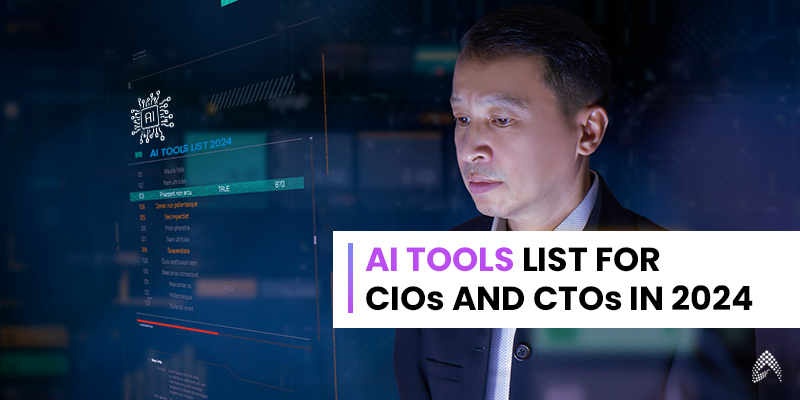AI Tools List For CIOs and CTOs In 2024

In today’s rapidly evolving business landscape, CIOs and CTOs face significant challenges in meeting the demands for innovation, efficiency, and exceptional customer experience.
Merely relying on generic Google searches or top 10 lists of AI tools may not suffice for organizations striving for true innovation and success. It’s crucial to understand how and where to implement AI tools across the organization to drive productivity and success while managing costs effectively.
Before that, let’s look into the top CIOs and CTOs’ priorities for 2024 – 2025 and dive deep into the AI tool’s list.
Top 10 Priorities List Of CIOs and CTOs: 2024 – 2025
- Enhanced cybersecurity
- Data-driven decision making
- Cloud optimization and management
- Automated IT operations
- Scalability and flexibility
- Enhanced customer experience
- Data analytics and insights
- AI-powered innovation
- IT infrastructure management
- Regulatory compliance and governance
Top 10 Priorities List Of CIOs and CTOs: 2024 – 2025
When selecting tools for your business, it’s important to remember that choosing mediocre tools will yield mediocre results. Given that each business operation has unique requirements, it’s crucial to invest time in evaluating the features and capabilities of each tool. Below are some top AI tools that can play a pivotal role in transforming your business operations, thereby enhancing productivity and decision-making.
Priority | Tool Name | Features | Benefits |
|---|---|---|---|
| Enhanced Cybersecurity | Darktrace | AI-driven threat detection, autonomous response, real-time monitoring. | Proactively defends against threats, reduces response time, and enhances data protection. |
| Data-Driven Decision Making | IBM Watson. | Natural language processing, predictive analytics, data integration. | Facilitates informed decisions, uncovers hidden insights, and improves operational efficiency. |
| Cloud Optimization and Management | CloudHealth by VMware. | Cost management, performance monitoring, automation. | Optimizes cloud spend, ensures cloud governance, and enhances resource allocation. |
| Automated IT Operations | UiPath | Robotic Process Automation (RPA), AI-driven workflows, task automation. | Increases operational efficiency, reduces human errors, and frees up IT resources. |
| Scalability and Flexibility | Google Cloud AI | AutoML, AI infrastructure, scalable machine learning models. | Provides scalable AI solutions, adapts to growing workloads, and accelerates innovation. |
| Enhanced Customer Experience | Salesforce Einstein. | AI-driven CRM, predictive analytics, personalized recommendations. | Improves customer engagement, boosts sales, and enhances customer satisfaction. |
| Data Analytics and Insights | DataRobot | Automated machine learning, predictive modeling, data integration. | Accelerates data analysis, provides actionable insights, and improves decision-making. |
| AI-Powered Innovation | Amazon SageMaker | Integrated development environment, automated model building | Speeds up AI development facilitates model deployment and supports continuous innovation |
| IT Infrastructure Management | Splunk | Real-time data analytics, IT operations monitoring, security management | Enhances IT performance, ensures system reliability, and improves security posture |
| Regulatory Compliance and Governance | Azure AI | AI-driven compliance tools, risk management, data governance | Ensures regulatory compliance, reduces risk exposure, and strengthens governance frameworks |
Guide to Evaluating AI Tools: Key Questions and Features to Consider
As a CIO or CTO, it’s crucial to assess AI tools for your organization based on their alignment with strategic goals, operational needs, and technical requirements. Check out this comprehensive guide on evaluating AI tools, including essential questions and features to consider.
1. Define Your Objectives
- Question: What specific business problems do we aim to solve with AI?
- Feature to Check: Ensure the tool’s capabilities align with your business objectives, whether it’s improving customer experience, optimizing operations, or enhancing cybersecurity.
2. Assess Compatibility and Integration
- Question: How well does this AI tool integrate with our existing systems and workflows?
- Feature to Check: Look for APIs, SDKs, and compatibility with your current software stack (e.g., CRM, ERP, cloud services). The tool should seamlessly integrate without requiring significant changes to your infrastructure.
3. Evaluate Data Handling Capabilities
- Question: How does this AI tool manage data ingestion, processing, and storage?
- Feature to Check: Ensure the tool supports your data formats, handles data securely and offers scalable storage options. Also, consider the tool’s ability to process large datasets efficiently.
4. Consider the Tool’s Scalability
- Question: Can this tool scale with our business as we grow?
- Feature to Check: Evaluate whether the tool can handle increased data volumes, user loads, and additional use cases over time. Check for features like auto-scaling and multi-cloud support.
5. Examine AI and Machine Learning Capabilities
- Question: What types of AI/ML models does this tool support, and how customizable are they?
- Feature to Check: Look for a range of pre-built models, support for custom model development, and the ability to fine-tune models based on your data. Also, consider if the tool supports real-time analytics and predictions.
6. Investigate Security and Compliance Features
- Question: How does this tool ensure data security and compliance with regulations like GDPR, HIPAA, etc.?
- Feature to Check: The tool should offer robust encryption, access controls, and compliance certifications. Ensure it provides features like data masking, secure APIs, and regular security updates.
7. Analyze the User Experience
- Question: How intuitive and user-friendly is this AI tool for our team?
- Feature to Check: Assess the tool’s UI/UX, the ease of deployment, and the quality of documentation and support. Look for tools that offer training resources, intuitive dashboards, and easy-to-navigate interfaces.
8. Evaluate Performance and Reliability
- Question: How reliable is the tool, and what is its uptime guarantee?
- Feature to Check: Look for service level agreements (SLAs) that guarantee uptime, regular updates, and the tool’s performance history. Consider tools with built-in monitoring and alerting features to ensure continuous performance.
9. Consider Cost and ROI
- Question: What is the total cost of ownership (TCO) and what ROI can we expect?
- Feature to Check: Assess not just the upfront costs but also ongoing expenses, including licensing, maintenance, and training. Compare the TCO with the expected ROI based on efficiency gains, cost savings, or revenue generation.
10. Investigate Vendor Support and Community
- Question: What level of support does the vendor provide, and how active is the user community?
- Feature to Check: Consider the quality of vendor support (e.g., 24/7 support, dedicated account managers) and the presence of an active user community for sharing insights and best practices.
11. Future-Proofing and Innovation
- Question: Is the AI tool regularly updated with new features and technologies?
- Feature to check: Choose a platform that is committed to innovation and staying ahead of the curve with advancements in AI and machine learning.
AI Tools: A Game Changer for Your Business Operations
To harness AI for business success, CIOs and CTOs must select the right AI tool. By asking the right questions and thoroughly evaluating features, they can choose a tool that aligns with strategic goals, integrates smoothly with existing infrastructure, and provides measurable value.
Still unsure about which AI tool to choose? Our AI expert team is ready to assist you with thorough analysis and the selection of the right tool.

President & CEO – Growth Markets




